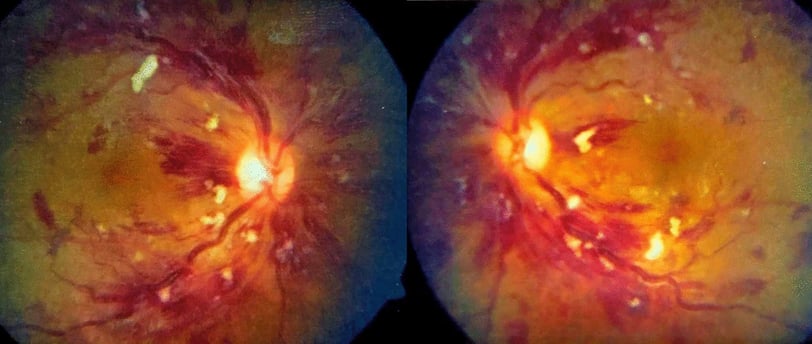Hyperviscosity Syndrome: A Rare "Thick Blood" Syndrome
Hyperviscosity syndrome occurs when the blood becomes excessively thick or viscous, hindering its ability to flow smoothly through the blood vessels. This increased viscosity can disrupt oxygen and nutrient delivery to vital organs, leading to a range of health complications. It is most commonly linked to hematological disorders, such as multiple myeloma or Waldenström macroglobulinemia.
HEMATOLOGY
Rishwin A R
1/8/20252 min read


Causes of Hyperviscosity Syndrome
The underlying causes of HVS are typically related to an abnormal increase in blood components. Some common causes include:
1. Excess Proteins in the Blood
Seen in conditions like multiple myeloma or Waldenström macroglobulinemia, where high levels of monoclonal immunoglobulins increase blood viscosity.
2. Elevated Red Blood Cells
Polycythemia vera, a condition characterized by the overproduction of red blood cells, can thicken the blood.
3. Leukocytosis (High White Blood Cell Count)
Often seen in leukemias, where an excessive white blood cell count impairs blood flow.
4. Severe Dehydration
Reduced plasma volume can increase the relative concentration of blood cells, leading to hyperviscosity.
Symptoms of Hyperviscosity Syndrome
Symptoms can vary depending on the severity of the condition but often include:
Neurological Symptoms: Headache, dizziness, blurred vision, confusion, or even seizures.
Bleeding Tendencies: Nosebleeds, gum bleeding, or unusual bruising.
Cardiopulmonary Issues: Shortness of breath or chest pain.
Fatigue: A constant feeling of exhaustion due to poor oxygen delivery.
These symptoms often appear gradually, making early diagnosis crucial.
Diagnosis of Hyperviscosity Syndrome
Diagnosing HVS involves a combination of clinical evaluation and laboratory tests:
1. Medical History and Physical Exam
Assessment of symptoms and potential underlying conditions.
2. Blood Tests
Serum Viscosity: Measures blood thickness.
Complete Blood Count (CBC): Identifies abnormalities in blood cell counts.
Protein Studies: Detects monoclonal protein levels.
3. Imaging and Specialized Tests
Eye examination to check for retinal changes.
Bone marrow biopsy in cases of suspected hematological malignancies.
Treatment Options for Hyperviscosity Syndrome
Timely intervention is essential to manage HVS and prevent complications. Treatment strategies typically include:
1. Plasmapheresis
A procedure to remove excess proteins or cells from the blood, thereby reducing viscosity.
2. Treatment of Underlying Conditions
Chemotherapy or targeted therapies for blood cancers.
Phlebotomy for polycythemia vera.
3. Supportive Care
Intravenous fluids to address dehydration.
Medications to control symptoms or prevent complications, such as anticoagulants.
Complications of Untreated Hyperviscosity Syndrome
Without treatment, HVS can lead to severe outcomes, including:
Stroke or other thromboembolic events.
Organ failure due to poor oxygenation.
Persistent bleeding complications.
Conclusion
Hyperviscosity syndrome, though rare, is a critical condition that necessitates prompt diagnosis and treatment. By understanding its causes, symptoms, and management strategies, patients and caregivers can ensure better outcomes. If you or a loved one is experiencing symptoms suggestive of HVS, consult a healthcare professional immediately.
FAQs About Hyperviscosity Syndrome
1. What causes hyperviscosity syndrome?
It is commonly caused by conditions like multiple myeloma, Waldenström macroglobulinemia, or polycythemia vera.
2. Is hyperviscosity syndrome life-threatening?
Yes, if untreated, it can lead to severe complications such as stroke or organ failure.
3. How is hyperviscosity syndrome diagnosed?
Through blood tests, imaging studies, and evaluation of underlying conditions.
4. Can hyperviscosity syndrome be cured?
Treatment can effectively manage the condition, especially if the underlying cause is addressed.
5. How can I prevent hyperviscosity syndrome?
While prevention depends on the underlying cause, maintaining hydration and regular health check-ups can help.
Syndromes.xyz
Explore medical syndromes and their details here.
For Educational purposes only
The information on this site is not in any way, replacement for professional advice. Always consult your physician regarding personal queries
Connect
Support
syndromesxyz@gmail.com
© 2024. All rights reserved.
